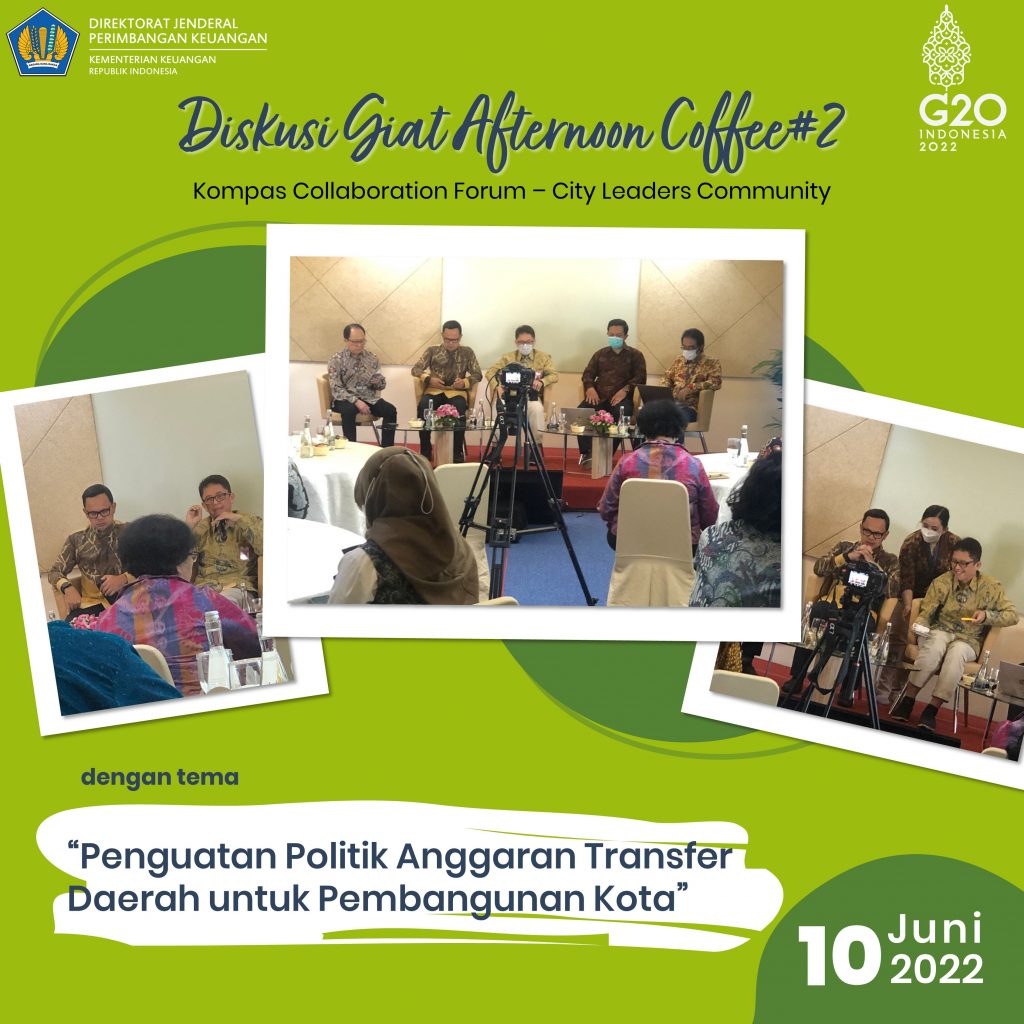Jakarta – The Director of General Transfer Funds, Mr. Adriyanto representing the Director General of Fiscal Balance, was a speaker at the Kompas Collaboration Forum-City Leaders Community APEKSInergi #2 discussion at the Kompas Tower, Jakarta, on Friday 10 June 2022, with the theme “Strengthening Regional Transfer Budget Politics for Development City”.
The discussion was also filled by several other speakers, namely the Mayor of Bogor who is also the Chairman of the Management Board of the Indonesian City Government Association (Apeksi) Bima Arya, Chief Editor of Kompas Sutta Dharmasaputra, Research and Development researcher Kompas Mahatma Chrysna, and Deputy Managing Editor of Kompas Haryo Damardono.
The discussion was moderated by Mr. Sutta Dharmasaputra, which was then opened by the Head of Apeksi, Mr. Bima Arya. Mr. Adriyanto was the speaker who presented material with the theme “Challenges of optimizing the city development budget”.
Fiscal decentralization and its impact on public services is one of the topics of discussion that is always raised, especially by local governments throughout Indonesia. Transfer funds to regions that tend to increase every year are expected to also improve services in the community.
In his presentation, Mr. Adriyanto conveyed five main topics that became the discussion outline regarding “Strengthening Regional Transfer Budget Politics for City Development”:
- Strategic Issues and Challenges of Urban Development
- Fiscal Reform for Regional Development
- Strengthening Input Aspects: Local Taxing Power And Urban-Based TKD
- Strengthening Process Aspects: The Role of Cities for Better Quality Shopping
- Urban funding alternatives: Debt Financing, Regional Endowments, Funding Synergies, Government and Business Entity Cooperation (PPP), and Regional Cooperation
Urban areas are projected to be the future of Indonesia, therefore urban development needs to be optimized so that cities can become drivers of economic growth in realizing people’s welfare. However, there are still several strategic issues that pose challenges to urban development such as population problems, high infrastructure needs, suboptimal potential and institutional issues. Currently, although on average urban services are better than districts/cities, the quality of services can still be further improved with the right political support for the budget.
To support this, currently Law Number 1 of 2022 concerning Financial Relations between the Central Government and Regional Governments (UU HKPD) has been enacted with the aim of strengthening fiscal decentralization as a tool for achieving economic recovery, as well as reducing unemployment and poverty through strengthening input aspects (local taxing power and TKD) and process aspects (the role of cities for higher quality spending).
Strengthening the input aspect will assist cities in increasing the allocation of resources more efficiently to accelerate development in urban areas, among others through strengthening PDRD policies and integrated and performance-based Transfer to Regions (TKD) policies. However, to support the optimization of urban development, strengthening the input aspect must still be supported by strengthening the process aspect, one of which is through strengthening budget politics in the regions.
Source: Kemenkeu.id

